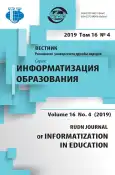Evaluation of the effectiveness of the use of case-technology in teaching computer modeling of future teachers of informatics
- Авторлар: Markovich O.S.1, Sergeev A.N.1
-
Мекемелер:
- Volgograd state social and pedagogical University
- Шығарылым: Том 16, № 4 (2019)
- Беттер: 351-364
- Бөлім: INNOVATION PEDAGOGICAL TECHNOLOGIES IN EDUCATION
- URL: https://journal-vniispk.ru/2312-8631/article/view/333514
- DOI: https://doi.org/10.22363/2312-8631-2019-16-4-351-364
- ID: 333514
Дәйексөз келтіру
Толық мәтін
Негізгі сөздер
Авторлар туралы
Olga Markovich
Volgograd state social and pedagogical University
Хат алмасуға жауапты Автор.
Email: omarkovich@yandex.ru
senior lecturer of the Department of Informatics and Methods of Teaching Informatics
27 Prospekt imeni V.I. Lenina, Volgograd, 400066, Russian FederationAlexey Sergeev
Volgograd state social and pedagogical University
Email: alexey-sergeev@yandex.ru
Әдебиет тізімі
- Baranova E.V., Laptev V.V., Simonova I.V. Podgotovka bakalavrov po napravleniju pedagogicheskogo obrazovanija v oblasti informatiki i IKT na baze jelektronnyh obrazovatel’nyh resursov [Training of bachelors in the direction of pedagogical education in the field of Informatics and ICT on the basis of electronic educational resources]. Regional’naja informatika “RI-2018” [Regional Informatics “RI-2018”]: proceedings of XVI Saint Petersburg international conference. Saint Petersburg, 2018. Pp. 356–358.
- Baranova E.V., Simonova I.V. Razvitie professional’nyh kompetencij bakalavrov po napravleniju pedagogicheskogo obrazovanija v oblasti informatiki v uslovijah cifrovogo obrazovanija [Development of professional competences of bachelors in the direction of pedagogical education in the field of informatics in the conditions of digital education]. Izvestija Rossijskogo gosudarstvennogo pedagogicheskogo universiteta imeni A.I. Gercena [Bulletin of the Russian State Pedagogical University named after A.I. Herzen]. 2018. No. 190. Pp. 116–124.
- Bugajko E.V. Metodicheskaja sistema kursa po formirovaniju znanij, umenij i navykov v oblasti komp’juternogo modelirovanija v podgotovke budushhih uchitelej informatiki [Methodical system of a course on formation of knowledge, abilities and skills in the field of computer modeling in preparation of future teachers of informatics]. Primenenie novyh tehnologij v obrazovanii [Application of new technologies in education]: proceedings of XVII International conference. Troick: FNTO “BAJTIK” Publ., 2006. Pp. 400–402.
- Gadzhikurbanova G.M. Didakticheskij potencial kejs-tehnologij v obuchenii informatike [Didactic potential of case-technologies in teaching informatics]. Vestnik Moskovskogo instituta gosudarstvennogo upravlenija i prava [Bulletin of the Moscow Institute of Public Administration and Law]. 2016. No. 15. Pp. 39–42.
- Doroshenko E.G., Pak N.I., Pushkareva T.P., Hegaj L.B., Jakovleva T.A. Metodicheskaja sistema obuchenija informatike studentov pedagogicheskih vuzov v uslovijah FGOS VO [Methodical system of teaching informatics to students of pedagogical universities in the conditions of Federal State Educational Standards of Higher Education]. Vestnik Krasnojarskogo gosudarstvennogo pedagogicheskogo universiteta imeni V.P. Astaf’eva [Bulletin of the Krasnoyarsk State Pedagogical University named after V.P. Astafiev]. 2015. No. 1(31). Pp. 36–44.
- Korolev A.L. Komp’juternoe modelirovanie v obrazovanii [Computer modeling in education]. http://gisap.eu/ru/node/18917
- Lobanova N.V., Man’shin M.E., Smykovskaja T.K. Ispol’zovanie kejs-tehnologii pri podgotovke budushhih uchitelej informatiki [Use of case-technology in the preparation of future teachers of informatics]. Izvestija Baltijskoj gosudarstvennoj akademii rybopromyslovogo fl psihologo-pedagogicheskie nauki [Bulletin of the Baltic State Academy of Fishing Fleet: Psychological and Pedagogical Sciences]. 2011. No. 3. Pp. 28–33.
- Markovich O.S. Predmetno-orientirovannye kejsy po informatike [Subject-oriented cases on computer]. Izvestija Volgogradskogo gosudarstvennogo pedagogicheskogo universiteta [Bulletin of the Volgograd State Pedagogical University]. 2017. No. 5(118). Pp. 70–75.
- Markovich O.S. Ispol’zovanie kejs-tehnologii pri obuchenii informatike [Use of casetechnology in teaching informatics]. Informacionnye tehnologii v obrazovanii “ITOSaratov-2017” [Information technologies in education “ITO-Saratov-2017”]: Proceedings of IX All-Russian Scientific-Practical Conference. Saratov: Nauka Publ., 2017. Pp. 47–49.
- Nikitina M.A. Kejs-metod kak sredstvo realizacii federal’nogo gosudarstvennogo obrazovatel’nogo standarta vysshego professional’nogo obrazovanija tret’ego pokolenija na zanjatijah po informatike [Case-method as a means of implementing the Federal State Educational Standard of Higher Professional Education of the Third Generation in the classroom in informatics]. Mir nauki, kul’tury, obrazovanija [World of science, culture, education]. 2013. No. 3(40). Pp. 126–128.
- Selivanova Je.T. Metodika obuchenija osnovam komp’juternogo modelirovanija v pedagogicheskom vuze i shkole [Methods of teaching the basics of computer modeling in pedagogical university and school]: dissertation of the candidate of pedagogical sciences. Novosibirsk, 2000. 144 p.
- Semakin I. G. Nauchno-metodicheskie osnovy postroenija bazovogo kursa informatiki [Scientific and methodical bases of construction of a basic course of informatics]: dissertation of the doctor of pedagogical sciences. Perm, 2002. 409 p.
- Simonova I.V. Kejs-tehnologii v programme povyshenija kvalifikacii prepodavatelej dlja obuchenija studentov razvitiju informacionnoj obrazovatel’noj sredy shkoly [Casetechnologies in the program of advanced training of teachers for teaching students to develop the information educational environment of the school]. Novye obrazovatel’nye strategii v sovremennom informacionnom prostranstve [New educational strategies in the modern information space]: collection of scientific articles based on the materials of the international scientific conference. Saint Petersburg: RGPU imeni A.I. Gercena, 2017. Pp. 152–155.
- Smoljaninova O.G. Didakticheskie vozmozhnosti metoda “case study” v obuchenii studentov [Didactic possibilities of the case study method in teaching students]. Gumanitarnyj vestnik [Humanitarian Bulletin]. 2000. No. 3. Pp. 32–35.
- Sofronova N.V. Sovremennye tendencii razvitija metodiki obuchenija informatike v shkole [Modern trends in the development of methods of teaching informatics in school]. Aktual’nye problemy matematicheskih i tehnicheskih nauk [Actual problems of mathematical and technical sciences]: collection of scientific articles. Cheboksary: ChGPU imeni I.Ja. Jakovleava Publ., 2016. Pp. 44–50.
Қосымша файлдар









